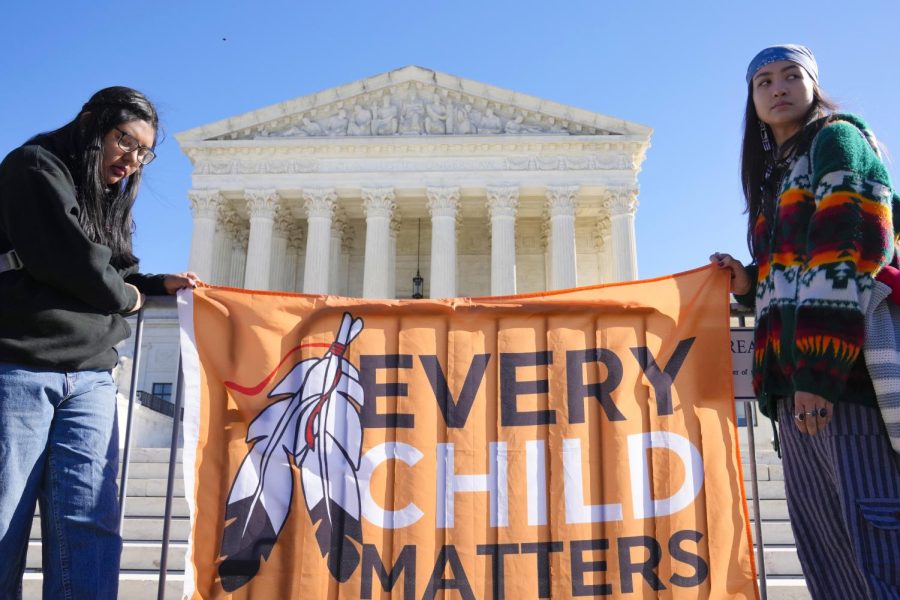Editorial | The Indian Child Welfare Act is necessary
Demonstrators stand outside of the U.S. Supreme Court, as the court hears arguments over the Indian Child Welfare Act last Wednesday in Washington.
November 18, 2022
The Indian Child Welfare Act, enacted in 1978, is a federal law that protects Native children by preventing the removal and out-of-home placement of Native children. After data revealed Native children were disproportionately removed from their homes and communities, the federal government intervened.
The practice of removing Native children from their communities became part of a radical mission to assimilate thousands of Native children. This practice is now one many fear could happen again, as the Supreme Court overhears a case challenging ICWA which began this month — Brackeen v. Haaland.
In February of this year, the Supreme Court agreed to hear the argument challenging the constitutionality of ICWA, brought up by the Brackeens, a white family in Texas trying to adopt an Indigenous Diné child. The family is represented pro bono by Gibson Dunn, a law firm whose clients include Energy Transfer and Enbridge, responsible for the Dakota Access and Line 3 pipelines that Indigenous people brazenly fought to stop due to environmental and cultural concerns.
Many people deem this lawsuit as yet another attempt by fossil fuel companies to eliminate federal oversight and protection of Indigenous communities, where many oil and gas projects run through.
The overruling of ICWA can produce many severe implications, but some of the most outstanding are the effects on children and Indigenous sovereignty and prosperity as a whole. After “Kill the Indian, Save the Child” campaigns began in the late 1800s, thousands of children were forcibly removed from their homes and placed into residential and boarding schools where their cultural identities and practices were stripped.
The last residential school in the United States closed in 1978 following the ICWA ruling, demonstrating the act’s immense importance. The traumatic impact of these schools and the subsequent oppression and discrimination of Indigenous children is a lasting legacy, especially as mass grave sites were recently uncovered on residential and board school grounds in the U.S. and Canada.
Undeniably, white people have committed horrible atrocities against Indigenous people for personal gain since European colonizers settled on this land. In a diversifying American society that aims to support and empower cultural and ethnic identities, it is imperative that Native children are housed within their tribal communities to ensure the health of Indigenous communities that have found themselves historically decimated at the hands of genocidal laws and practices.
And although adopting a child can be admirable, if any motive besides giving a child in need a good home is the prerogative, that person does not deserve to parent a child. There are currently over 407,000 children in foster care, so why are the Brackeens so dead set on adopting a Native child when there are so many children awaiting homes? Adoption experts also emphasize that placement with relatives and kin can substantially increase stability, reduce trauma and help children maintain a sense of family, belonging and identity. All in all, there is no reason for the court to consider overturning ICWA in regard to what is best for the child.
The reality is that politics should not play a factor in determining where adoptable children are housed, nor should the Supreme Court intervene in a way that hinders the wellbeing of Indigenous families and communities. Instead, the reality should be one that best suits the children, and ICWA helps not only to ensure the prosperity of Native children, but also how resilient and strong Native tribes are in the United States.
ICWA cannot be overturned for the well-being of Indigenous communities and for the integrity of the United States and its faltering democratic institutions.








